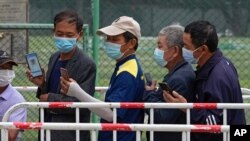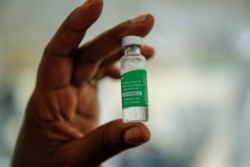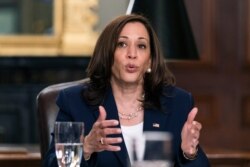China says it hopes to have 80% of its 1.4 billion citizens vaccinated by the end of the year.
As of Wednesday, China had administered an estimated 704 million doses, mostly in May, according to The Associated Press.
The AP also reported that China is providing about 19 million shots a day, and that the U.S. topped out at about 3.4 million shots a day during April’s peak.
The number of fully vaccinated people is unavailable because China does not release the data.
About 87% of Beijing residents have received at least one dose, but that is likely much higher than the national average.
COVAX financial boost
In other pandemic news, the World Health Organization’s program to secure and distribute billions of COVID-19 vaccine doses to the world's poorest countries has received a major financial boost.
The COVAX initiative received nearly $2.4 billion in pledges Wednesday during a virtual summit hosted by Japan, which made the largest pledge, $800 million. The program also received significant financial pledges from Canada, France, Spain and Sweden. COVAX has raised $9.6 billion since its creation.
Several nations also pledged to donate millions of doses from their domestic stockpiles to COVAX, with Japan again leading the way with a promise to donate 30 million doses.
COVAX is an alliance that includes the Coalition for Epidemic Preparedness Innovations and Gavi, the Vaccine Alliance, an organization founded by Bill and Melinda Gates to vaccinate children in the world’s poorest countries. The program has so far distributed 77 million vaccine doses to 127 countries, far below its initial pledge of up to 2 billion doses this year.
U.S. Vice President Kamala Harris reminded the summit that the Biden administration has pledged a total of $4 billion to COVAX for 2021-22, but she made no new pledges of additional financial or vaccine donations. President Joe Biden has also pledged to donate 80 million doses from the U.S. COVID-19 vaccine stockpile.
Reuters news agency reported that India has signed a contract with domestic biotechnology firm Biological -E to purchase 300 million doses of its experimental vaccine. The Health Ministry said Thursday that it had paid the firm a $205 million advance to secure the vaccine, which is undergoing widespread late-stage clinical trials.
Reuters also reports that Taiwan’s government has approved legislation that will allocate nearly $3 million toward the island’s COVID-19 response efforts. The money will allow the Health Ministry to buy and test vaccines and treatments and help improve monitoring and testing for the coronavirus.
In an interview with the AP, Eric Lander, Biden’s new science adviser, said he envisions a future where a new vaccine could be ready within 100 days of the initial recognition of “a virus with pandemic potential.” Lander said that could be done through a so-called “plug-and-play” process that adds the genetic code for the germ using messenger RNA technology — a process used in developing both the Pfizer and the Moderna COVID-19 vaccines.
Tokyo Games
With just weeks to go before opening ceremonies, the troubled Tokyo Olympics sustained another blow this week when 10,000 volunteers quit because of concerns about the surge of new infections sweeping Japan.
Toshiro Muto, the chief executive of the Tokyo Olympics organizing committee, told reporters Wednesday the resignations would not have a negative impact on the event because foreign spectators have been banned from attending the games.
The Tokyo Olympics were postponed for a year in 2020, as the pandemic began spreading across the globe. Seiko Hashimoto, president of the organizing committee, ruled out another postponement in an interview in the Nikkan Sports newspaper Thursday.
But Dr. Shigeru Omi, the government’s top medical adviser, told a parliamentary committee Wednesday that it would be abnormal to hold the Olympics during the current surge of infections and that it was the organizers’ responsibility to scale down the games if the situation continued.
The Tokyo Olympics are facing growing public opposition amid the new wave of COVID-19 infections and the slow vaccination rate. The Japanese capital and several other regions in Japan are under a state of emergency that was set to expire Monday but has been extended until June 20, just over a month before the opening ceremonies.
A public opinion survey published Monday by the Nikkei business newspaper revealed that more than 60% of respondents want the games to be delayed again or canceled outright, compared with just 34% in favor of holding the event as scheduled.
The Asahi Shimbun newspaper, a major sponsor of the games, published an editorial last week calling for the event to be canceled because of the worsening COVID-19 crisis, becoming the first major Japanese newspaper to do so. The Tokyo Medical Practitioners Association, which represents about 6,000 primary care doctors and hospitals, has also called on Prime Minister Yoshihide Suga to persuade the International Olympic Committee to cancel the event.








